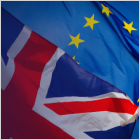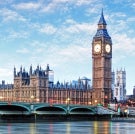Following Labour’s landslide general election victory, Sir Keir Starmer’s new government has wasted no time in signalling its intentions to improve upon the current Brexit deal negotiated by Boris Johnson.
In a visit to Edinburgh on Sunday, the new prime minister said work had already begun to build closer ties with the European Union as he told reporters “that we can get a much better deal than the botched deal that Boris Johnson saddled the UK with”.
Writing in The Local Europe, foreign secretary David Lammy – who could attend the September meeting of the EU foreign affairs council – added that the new government would “reset relations with Europe as a reliable partner, a dependable ally and a good neighbour.”
And Irish prime minister Simon Harris said Brussels would be willing to offer the UK a new deal on post-Brexit issues, suggesting there was “space” to work more closely with Britain as he pledged that Ireland would be an ally in any negotiations.
Here The Independent takes a look at what Labour has said about different aspects of the UK’s relationship with the EU.
Freedom of movement
Following the UK’s departure from the EU, the rights of British to travel and work within the bloc – and vice versa – were restricted.
This has had a huge impact on the music, travel and other industries, while passport queues could be set to get even worse in the months ahead if Brussels implements its much-delayed automated EU Entry/Exit system, which will see biometric photos and fingerprints required for Britons to enter into the Schengen area.
The new business secretary Jonathan Reynolds has said that removing certain barriers to trade “makes sense”, such as the “completely sensible” idea of Britain and the EU recognising each other’s professional qualifications.
“If you are in the creative industries you’ve really suffered in your ability to move around the European Union in terms of the restrictions on that. These are practical things,” Mr Reynolds told Sky News on Sunday after the general election.
And in his piece for The Local Europe, Mr Lammy wrote: “We must do more to champion the ties between our people and our culture”, pointing to “holidays, family ties, school and student exchanges, the arts, and sport”.
But pressed on free movement of people, Mr Reynolds said: “We’re not open to the free movement of people, that is something that is part of membership of the European Union and, as I said, we’re not revisiting that.”
Defence and security
While the UK and EU continued to cooperate on security in some respects post-Brexit, a House of Lords committee warned last year of “significant losses in capability”, including lost access to the EU’s largest security database and more than a dozen member states ceasing to extradite suspects to the UK.
Speaking to reporters in Edinburgh, Sir Keir suggested that an improved relationship with Brussels “means closer ties in relation to research and development, and closer ties in relation to defence and security”.
Mr Lammy has said that the government’s proposal for an “ambitious and broad-ranging” UK-EU security pact would seek to “underpin closer co-operation between us”.
In its manifesto, Labour pledged to seek a new security agreement with the EU “to ensure access to real-time intelligence and enable our policing teams to lead joint investigations with their European counterparts”.
On defence, the party pledged: “Our commitment to Nato as the cornerstone of European and global security is unshakeable. We will be confident in our status outside of the EU, but a leading nation in Europe once again, with an improved and ambitious relationship with our European partners.”
Rejoining the single market
While the Trade and Co-operation Agreement struck in 2020 has allowed tariff-free trade with the EU, trade barriers are still higher than prior to Brexit – driving up the price of food and other goods, while frequently causing delays at the border.
But on the eve of the general election, Sir Keir said he could not see the UK rejoining the European single market or customs union in his lifetime.
He added: “I’ve been really clear about not rejoining the EU, the single market, or the customs union, or returning to freedom of movement.
“I’ve been equally clear that I do think we can get a better deal than the botched deal we got under Boris Johnson – on the trading front, on research and development, and on security.”
On the issue of trade, Sir Keir suggested in September that a Labour government would seek to remain aligned with EU rules – striking a different tone to proponents of Brexit who hailed the potential for divergence as a key Brexit benefit.
Sir Keir said: “Actually we don’t want to diverge, we don’t want to lower standards, we don’t want to rip up environmental standards, working standards for people that work, food standards and all the rest of it.”
Source: independent.co.uk



